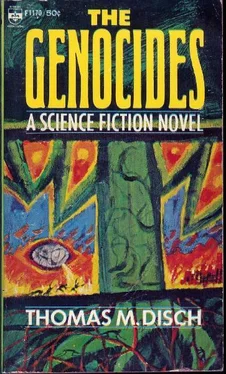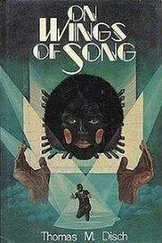It was not impossible nor even unlikely; it was equally possible and likely that he was being led into a trap. “One moment,” he told the woman. He signaled to Jackie to stay where she was and walked up the gentle slope of the hill. He scanned the debris that the years had heaped there and selected a strip of lathing that must have dropped from a load of firewood. Halfway up the hill he stopped behind one of the Plants that had broken through the asphalt. He hurled the stick of lathing over the crest of the bill.
Before it reached the top of its arc it flared into flame, and before it fell out of sight, the flame was dead. The wood had been utterly consumed.
“You’re right,” he said, returning to the woman. “And we thank you.”
Jackie rose to her feet. “We don’t have any food,” she announced, less to the old woman than to those she supposed were surrounding them. The habit of distrust was too strong to break in an instant.
“Don’t worry, my dears, you’ve passed your first test, such as it is. As far as we’re concerned, you’ve shown your mettle. If you only knew how many people walk right on up….” She sighed. “My name’s Alice Nemerov, R.N. Call me Alice.” Then, almost as an afterthought: “The letters mean I’m a nurse, you know. If you get sick, I can tell you the name of what you’ve got. Even help a little, sometimes.”
“My name’s Jeremiah Orville, MS. Call me Orville. My letters mean I’m a mining engineer. If you have any mines, I’ll be happy to look at them.”
“And you, my dear?”
“Jackie Janice Whythe. No letters. I’m an actress, for the love of God! I have thin hands, so I used to do a lot of soap commercials. But I can shoot, and I don’t have any scruples that I know of.”
“Splendid! Now come along and meet the other wolves. There are enough of us to make a tidy pack. Johnny! Ned! Christie! All of you!” Shards of shadows disengaged themselves from the static darkness and came forward.
Jackie hugged Orville about the waist delightedly. She pulled at his ear, and he bent down for her to whisper in it. “We’re going to survive after all! Isn’t that wonderful?”
It was more than they had expected.
All his life he had hoped, had Jeremiah Orville, for better things. He had hoped when he started college to become a research scientist. Instead he had drifted into a comfortable job with more security (it had seemed) than San Quentin. He had hoped to leave his job and Duluth as soon as he had saved $10,000, but before the fabled sum, or even half of it, was put together, he was married and the owner of a nice suburban home ($3,000 down, ten years to pay the balance). He had hoped for a happy marriage, but by then (he married late, at age 30) he had learned not to hope too hard. By 1972, when the Plants came, he was at the point of transferring all these choice hopes to the slender shoulders of his four-year-old son. But little Nolan proved unable to support even the burden of his own existence during the first famine that hit the cities, and Therese lasted only a month or two longer. He heard of her death by chance the following year: shortly before she had died he had deserted her.
Like everyone else, Orville pretended to hate the invasion (in the cities it was never considered anything but that), but secretly he relished it, he gloried in it, he wanted nothing else. Before the invasion, Orville had been standing on the threshold of a gray, paunchy middle age, and suddenly a new life—life itself!—had been thrust upon him. He (and anyone else who survived) learned to be as unscrupulous as the heroes in the pulp adventure magazines he’d read as a boy—sometimes, as unscrupulous as the viliains.
The world might die about him. No matter: he was alive again.
There had been the intoxication, while it lasted, of power. Not the cool, gloved power of wealth that had ruled before, but a newer (or an older) kind of power that came from having the strength to perpetuate extreme inequity. Put more bluntly, he had worked for the Government. First, as a foreman over pressed-labor gangs; later (within only a few months, for the pace of events was speeding up), as the director of the city’s entire labor operation. At times he wondered what difference there was between himself and, say, an Eichmann, but he didn’t let his speculations interfere with his work.
In fact it was this, the strength of his imagination, that let him see the untenability of the Government’s position and make suitable preparations for its collapse. The farmers could not be driven much further. They had the habit of independence and resented the parasitism of the cities. They would revolt and keep their little food to themselves. Without rations, the slaves in the city (for, of course, that’s what they were—slaves) would either revolt or die. In any case, they would die. So (after suitable bureaucratic fictions and a few bribes had had the building condemned), Orville had provisioned his fortress in the basement of the First American National Bank and retired from his life of public service.
There had even been a romance, and it had progressed (unlike his marriage) exactly as a romance should progress: a strongly contested courtship, extravagant declarations, fevers, jealousies, triumphs—oh unceasing triumphs, and always the aphrodisiac of mortal danger that suffused the alleys and looted stores of the dying city.
Three years he had been with Jackie Whythe, and it seemed no more than a holiday weekend.
If it were true for him, would it not be true for the other survivors as well? Did they not all feel this clandestine gladness in their hearts, like adulterers together secretly in a strange town? It must be so, he thought. It must be so.
Past the Brighton Beach Tourist Camp, the Plants grew denser and the urban sprawl thinned. The fortuitously met little group had come to the wilderness, where they might be safe. As they moved northeast on Route 61, the dim light of the burning city faded behind them, and the dimmer light of the stars was blotted out by foliage. They advanced into perfect darkness.
They moved rapidly, however, for though the Plants had broken through the road wherever they wished, they had not obliterated it. It was not as though the hurrying band had to fight its way through one of the old scrub woods that had once grown around here: no branches tore at one’s face; no brambles snagged one’s feet. There were not even mosquitoes, for the Plants had drained all the marshes roundabout. The only obstructions were occasional potholes, and sometimes, where the Plants had broken the asphalt sufficiently to give headway to erosion, a gulley.
Orville and the others followed the highway until morning glowed grayly through the eastern mass of forest, then turned toward the light, toward the lake, which had once been visible to the cars driving along this road. It seemed dangerous to follow Route 61 any farther, as though it were an extension of the city and subject to the city’s fate. Then, too, they were thirsty. If luck was with them, they might even get fish from the lake.
The route had been forced on them by circumstances. It would have been wiser, with the winter in view, to move south, but that would have meant circling the burning city, a chance in no way worth taking. There was no water to the west, and to the east there was too much. Lake Superior, though diminished, was still an effective barrier. Perhaps one of the lakeshore villages would have maintained serviceable boats, in which case they might turn pirate, as that fleet of tugboats had done three years before when Duluth Harbor ran dry. But the best probable direction was to continue northeast along the shore of the lake, looting the farms and villages. Worry about winter when winter came.
Lake Superior teemed with sunfish. Cooked over a driftwood fire, they were good even without salt. Afterward the group discussed, with some attempt at optimism, their plight and prospects. There was not much to decide: the situation dictated its own terms. The gathering was in fact less a discussion than a contest among the sixteen men to see who would assume leadership. Their band had been formed at hazard. Except for the couples, they did not know each other. (There had been little social life those last years; the only community that had survived in the cities had been the pack, and if any of these men had been in a pack before, he wasn’t talking about it now.) None of the contenders for leadership seemed willing to discuss the details of his own survival. Such reticence was natural and becoming: at least they had not become so brutalized as to exult in their depravity and brag of their guilt. They had done what they had to, but they were not necessarily proud of it.
Читать дальше












